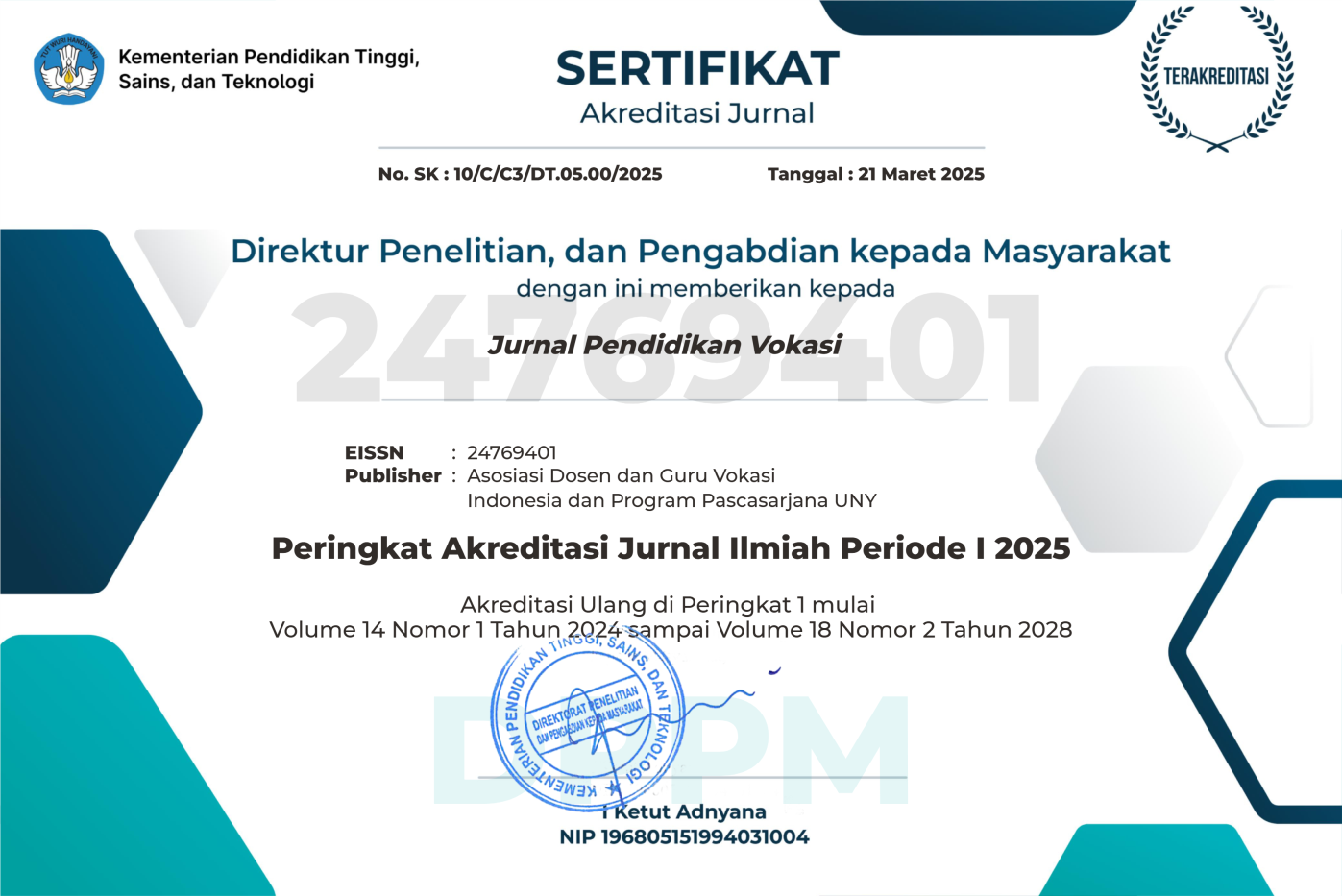Pengelolaan unit produksi SMK Negeri rumpun bangunan di Daerah Istimewa Yogyakarta (studi kasus SMKN 2 Pengasih Kulonprogo)
DOI:
https://doi.org/10.21831/jpv.v5i2.6381Keywords:
pengelolaan, unit produksiAbstract
Penelitian bertujuan untuk mengungkapkan: perencanaan, pengorganisasia, pelaksanaan, dan pengawasan unit produksi Jurusan Teknik Konstruksi Kayu di SMKN 2 Pengasih, Kulonprogo. Penelitian ini merupakan penelitian kualitatif dengan pendekatan studi kasus. Subjek penelitian ini adalah pengelola unit produksi, yang meliputi: Ketua UPJ, Ketua UPJ sekolah, dan Kepala Bengkel. Teknik pengumpulan data adalah wawancara, observasi dan dokumen. Analisis data melalui pemilahan data, reduksi data, penyajian data, dan penarikan kesimpulan. Hasil penelitian: perencanaan belum dilakukan dengan baik; kendala tidak ada rapat rutin dan lemahnya dokumentasi; tidak semua pengelola terlibat; pengorganisasian belum cukup baik; kendala dalam personalia, sarana dan peralatan yang kurang serta koordinasi; langkah-langkah pelaksanaan lebih menyerupai proses produksi; unit produksi belum berfungsi dengan baik sebagai sarana belajar; pelaksanaan terkendala bengkel yang sekaligus menjadi tempat praktik; langkah dan prinsip pengawasan diterapkan dalam pelaporan keuangan; pihak yang melakukan pengawasan yaitu ketua UPJ Sekolah, ketua UPJ jurusan, dan kepala bengkel; pengawasan terkendala pada tidak adanya SOP.
THE MANAGEMENT OF PRODUCTION UNIT OF VOCATIONAL HIGH SCHOOL IN THE FIELD OF BUILDING PROGRAM IN SPECIAL REGION OF YOGYAKARTA (A CASE STUDY OF SMKN 2 PENGASIH KULONPROGO)
Abstract
This research is aimed to reveal: the planning, the organizing, the implementation, and the controlling of the production unit of Wood Construction Engineering Department of SMKN 2 Pengasih, Kulonprogo District. The research was qualitative with the case study approach. The subjects of the research were the managers of production unit, including; the managers of UPJ, the head of the school's UPJ, and the head of the workshop of wood construction. The technique used in the data collection was interviews, observations and documents. The data analysis was conducted by the stages of the data selection, data reduction, data presentation, and conclusions drawing. The results of the research; the planning has not been implemented optimally; the obstacles in the planning, i.e. the absence of regular meetings, specifically those discussing and the lack of documentations; not all the managers are involved; the organizing involves the distribution of the tasks, the delegation of tasks and authorities, as well as coordination; the obstacles in the personnel, inadequate facilities and infrastructure as well as the coordination; the implementation measures indicate the implementation functions applied are more like the implementation of the production process; the production unit has not functioned properly as a educational tool; the implementation is constrained by the workshop which also becomes a practicum place; the steps and the principles of supervision are only applied in terms of financial statements; the parties supervising the UPJ are the managers of the school UPJ, the managers of the department UPJ, and the head of the workshop; the supervision is constrained to the absence of SOP.
References
Alptekin, S.E., Pouraghabagher, R., McQuaide, P., Poly, D.W.C. (2011). "Teaching Factory." Proceedings of the 2011 American Society for Engineering Education Annual Conference and Exposition, American Society for Engineering Education. Session 3563.
Bush, T., & Coleman, M. (2000). Leadership and Strategic Management in Education. London: Sage Publication.
Depdiknas. (2003). Undang-Undang RI Nomor 20 Tahun 2003 tentang Sistem Pendidikan Nasional.
Fattah, Nanang. (2004). Landasan Manajemen Pendidikan. Bandung: Rosdakarya.
Gibson, Ivancevich, & Donnely. (1996). Organisasi: Perilaku, Struktur, dan Proses. Terjemahan Nunuk Andiarni dan Editor Lyndon S. Jakarta: Binarupa Aksara.
Handoko, Hani. (2003). Manajemen (Edisi Kedua). Yogyakarta: BPFE Fakultas Ekonomi UGM.
Hasibuan, Malayu. (2014). Manajemen Sumber Daya Manusia. Jakarta: Bumi Aksara.
Usman, Husaini. (2014). Manajemen: Teori, Praktik, dan Riset Pendidikan. Jakarta: Bumi Aksara.
Kinici, A., & Williams, B.K. (2008). Management. New York: McGraw Hill.
Meyer, J.P., Stanley, D.J., Herscovitch, L., & Topolnytsky, L. (2002). "Affective, Continuance, and Normative Commitment to the Organization: A Meta-analysis of Antecedents, Correlates, and Consequences." Journal of Vocational Behavior, 61, 20–52.
Muhammad, Arni. (2004). Komunikasi Organisasi. Jakarta: Bumi Aksara.
Nasir, S.B. (2012). "Strategy to Revitalize Technical and Vocational Education and Training (TVET): Management Perspectives." Global Journal of Management and Business Research, Volume 12, Issue 23.
Sudira, Putu. (2006). Kurikulum Tingkat Satuan Pendidikan SMK. Jakarta: Depdiknas.
Robbins, S. P., & Coulter, M. (2014). Management (Edisi Ketiga). London: Pearson.
Darjanto, Singgih. (2012). "Manajemen Unit Produksi dan Jasa di Sekolah Menengah Kejuruan Umar Fatah Rembang." Journal of Economic Education, Vol. 1, No. 1.
Stoner, J.A.F., Freeman, R.E., & Gilbert, D.A. (1995). Management. Englewood Cliffs: Prentice Hall.
Tawardjono, Us. (2012). "Model Unit Produksi SMK di Daerah Istimewa Yogyakarta: Studi Kasus di SMKN 2 Pengasih Kulonprogo." Disertasi, Universitas Negeri Yogyakarta.
Zajda, J., & Gamage, D.T. (2009). Decentralisation, School-based Management, and Quality. London: Springer Science.
Downloads
Published
How to Cite
Issue
Section
Citation Check
License
The authors submitting a manuscript to this journal agree that, if accepted for publication, copyright publishing of the submission shall be assigned to Jurnal Pendidikan Vokasi. However, even though the journal asks for a copyright transfer, the authors retain (or are granted back) significant scholarly rights.
The copyright transfer agreement form can be downloaded here: [JPV Copyright Transfer Agreement Form]
The copyright form should be signed originally and sent to the Editorial Office through email to jpvokasi@uny.ac.id
Jurnal Pendidikan Vokasi by http://journal.uny.ac.id/index.php/jpv is licensed under a Creative Commons Attribution-ShareAlike 4.0 International License.












